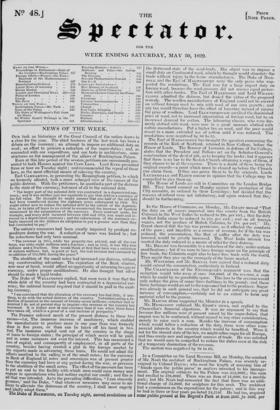In the House of Commons, on Monday, Mr. GRANT moved
"That the duty on all sugars imported into this county from the British Colonies in the West Indies be reduced to 20s. per cwt. ; that the duty on East India sugar be reduced to 25.c. per cwt. ; and on all foreign sugars, not the produce of British Colonies, to 28s. per cwt." Mr. Grant showed that the tax was pernicious, as it affected the comforts of the poor ; and impolitic as a source of revenue, for if the tax was reduced, the consumption, like that of coffee after the duty was lowered, would be greatly increased. The West India interest too wanted the duty reduced as a means of relief for their distress.
Mr. BRIGHT was favourable to a reduction of the duty, under certain modifications ; but if we were to have foreign sugar on the principle of free trade, the Colonists ought also to have free trade with the world. Then might they give up the monopoly of the home market.
Mr. WHITMORE and Mr. BERNAL were agreed that a reduced duty would extend the consumption, particularly in Ireland. The CHANCELLOR of the EXCHEQUERS argument was, that the reduction would take away at once 560,0001. of the revenue, a sum which he could by no possibility spare. This loss to the revenue would only reduce the price of sugar three-farthings in the pound ; and these three farthings would go not to the consumer but to the producer. Sugar was already in such general use, that lie did not anticipate any great increase of consumption,—certainly not to an extent to form any material relief to the grower. Mr. BARING alone supported the Minister in a speech. Mr. HUSKISSON enforced Mr. Grant's views, and replied to the Chancellor's financial objections. It was no argument to say that because five millions were at present raised by the sugar-duties, that impost was to be continued, without regard to any other consideration, merely to raise such a sum. Besides the increase of consumption which would follow a reduction of the duty, there were other com- mercial interests in the country which would be benefited. Were it not for the absurd state of the law, we might refine sugar for all Europe, and thus create new and important sources of trade. He was satisfied that we would soon be compelled to reduce the duties even at the risk of a temporary diminution of the revenue.
The motion was negatived by 98 to 60.


















